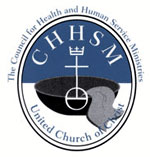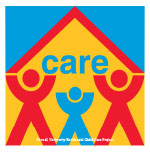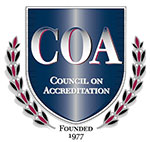PROGRAMS
GET INVOLVED
SUPPORT OUR MISSION

As a nation, our attention is turned to dealing with COVID-19 and helping our communities adjust to the realities of shelter-in-place. While self-isolation slows down the transmission of COVID-19, the flip-side is that self-isolation leaves many individuals vulnerable to abuse. April is National Sexual Abuse Awareness Month. It is not often that individuals catch a glimpse into the lives of commercially sexually exploited children (CSEC). Human trafficking is both in plain sight and hidden. At Hoyleton, we have a unique program, Healing And Loving Oneself (HALO), which offers hope and a means of recovery and healing for youth that have been sexually exploited. Below, a Hoyleton HALO Advocate and a client share their reflections on the journey to the other side.
To whoever is entering HALO,
It will be tough at first and you will be tested a lot but in the end, it will all be worth it! What is HALO to me? HALO helps people like me stay out of the streets. How? I used to think of running the streets every day. Now, I am almost seventeen, and all I want is to be successful in life. I want to go to college and have a good job and a nice place to stay. Alexis has never given up on me even at the times I wanted to give up on myself. She has stayed consistent and became a very important person in my life. I’ve learned that running away from your problems only makes things worse because eventually, your problems are going to deal with you.
-Female Youth
I know from my experience of working with victims and survivors of trafficking they often feel loss, trauma, a sense of hopelessness, and other challenging emotions. Individuals describe to me not feeling “normal” compared to others. As an advocate, I want to inspire hope for the individuals in HALO. Every client is unique, as is every session I do with them. When I start working with them, I try to build a relationship by keeping our session topics light. We try to get to know each other and understand each other’s expectations. It is as important for me to understand their expectations as it is for them to understand mine.
As we begin to progress into the program, we will identify emotions and reactions to situations; this is important for them to learn as it sets the foundation for their coping skills. I do my best to help the client fill the need they are lacking (love, trust, knowledge, comfort, support, skills, etc.). During our weekly sessions, I start by checking in with them. How their week has been? What their struggles have been? Any good news to share? Sometimes the good news is the hardest part for them to identify.
Sessions have a loose structure as I let my client decide where to take the day’s session. Many of the clients struggle with love, trust, and acceptance, so I model to them what a healthy relationship should look like in their life. I do this by being there for them when they call, text, or message me. I listen to them when they are upset or confused. When they are unhappy with me, we talk through that and how they feel about the situation. I also talk with them about their experiences and help them understand their emotions. The clients get to practice the tools we worked on during our sessions when they communicate with me. These new skills help them feel empowered, and it helps them cope with what’s happening in their life. Transparency plays a key role in the client’s recovery. An individual needs to be open with me about where they are struggling in the process, so I know what our next steps should be. Best case scenario, I work with the client on life skills to move towards independence or stability. Worst case scenario, I am the one person in the client’s life that they know will not give up on them, judge them, and will always be there to pick them up when they fall.
While individuals cannot volunteer to work with survivors, they can partner with the Prevention Department. Donations in the form of gift cards are appreciated as youth are transitioning and moving into a place of security. Advocacy is another aspect of influencing the conversation surrounding sexual abuse and exploitation. The Prevention Department is available to educate individuals and groups on the topic to bring awareness to our communities. If you are interested, please contact the Prevention Department at 618.688.4739. Together, we can protect our children’s future.


